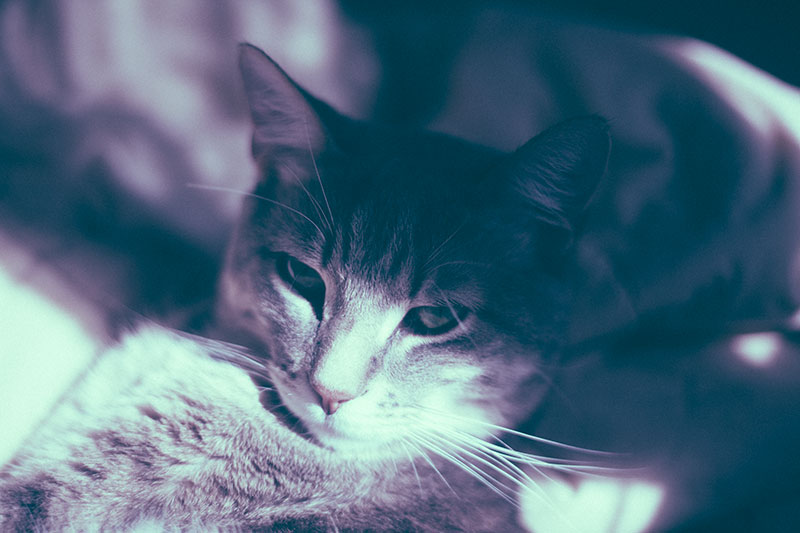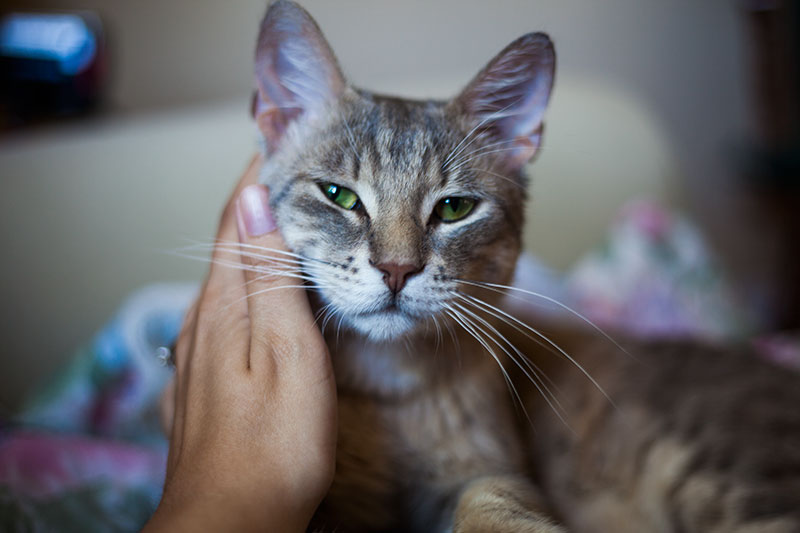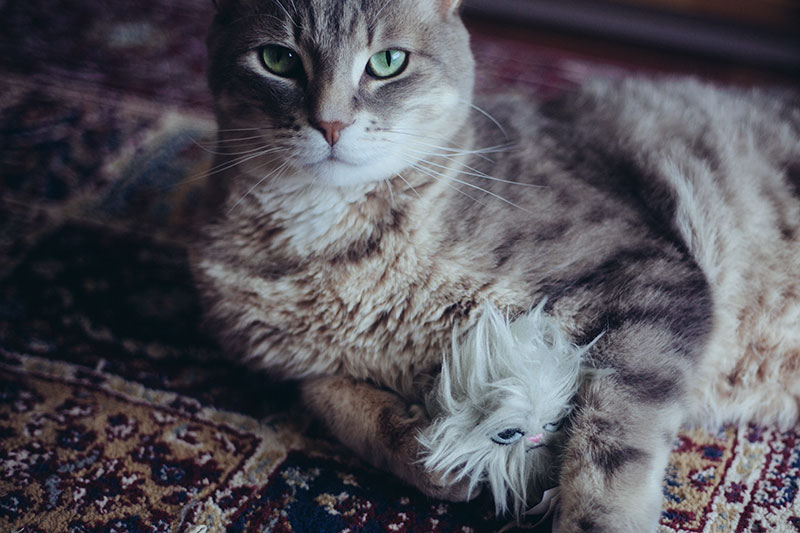Made your way here because you’ve noticed a whisker or two lying on the ground in your home? Upon seeing that whisker did you think, “Wait – why’s my cat losing whiskers? Do cats shed their whiskers? Is it normal for them to lose a whisker or two here or there, or is something wrong with my cat?”
First, let me commend you for quickly looking up the answer to your question. No better way to make sure that nothing is wrong with your cat than being sure to check on absolutely anything you suspect even might be a symptom of a bigger problem.

There are at least a few different symptoms I’ve come across that to humans are likely to appear to be nothing. That’s because when those specific symptoms happen to humans, they’re quite normal and don’t typically indicate anything to be stressed over. When a cat has these seemingly insignificant symptoms, however, they’re actually a subtle indication there’s likely to be trouble brewing with your feline’s health. Take the act of grinding teeth for instance; totally fine and typically nothing serious at all when humans do it, but if your cat’s no longer a kitten who’s teething, teeth grinding in cats may be a sign of dental issues, or other quite large health related issues, and thus should be looked into with a quick visit to the vet.
Cats haven’t got a way to tell us when something’s up and if they’re in pain through language, so it’s up to us to double check anything we suspect may be a symptom is a-ok. And vets have the hard role of trying to determine what’s wrong with a furry patient that can’t voice how they physically feel, so the more potentially relevant information you can collect about your pet to report back to your vet with, the faster you may be able to help an accurate diagnosis to be made.
If you noticed your cat lost a whisker or two, besides congratulating you on being both observant and proactive with your concern over your furry, I’m going to start off by letting you know that in terms of health, you likely have nothing to be concerned about. The story is different, however, if your has lost quite a number of whiskers in a short period of time – not just one or two. Let’s start off with why cats typically lose their whiskers, then we’ll get into what quantity and frequency is normal for them to shed and whether something may actually be wrong.
 Picture from post Avery’s Baby Pictures
Picture from post Avery’s Baby Pictures
Why Do Cats Lose Their Whiskers?
The First Part of the Explanation: Cats Shed Their Hair/Fur
Even if you’ve never owned a cat in your life before, you likely know one thing very well about cats in relation to their hair/fur: cats shed.
But this is not unique to cats in any way at all. Dogs, hamsters, and ferrets all shed their fur, snakes shed their skin, heck, even humans shed their skin and hair, we just don’t often think about it happening because our skin and hair is shed so slowly, we likely never really notice it at all. Humans lose only around 50-100 hairs a day out of the 90,000-150,000 hairs just on our heads alone. That’s not all that obvious as far as hair loss goes.
Some dog breeds shed hair like humans do – so slowly you would barely count it as shedding at all. Breeds like Maltese dogs, poodles, and Shih Tzus have hair that grows like hair on human heads does – long, and without being replaced all that often. Their hair thus needs to be cut when it gets long in order to keep it maintained at an easy-to-live-with length, again, just like human hair. Other dog breeds shed their fur more rapidly, and maintain a perfect haircut with no cut needed whatsoever, the same way hamsters and ferrets do.
Cats that have hair all have the sort that sheds fairly quickly like hamsters and ferrets. Unlike with dogs, there aren’t cat breeds whose hair needs to be cut in order to make sure it doesn’t get very long, like poodle hair does.
But you came here to talk about whiskers, so let’s get to the next point…
The Second Part of the Explanation: Whiskers Are Nothing More Than Specialized Cat Hairs
Whiskers aren’t regular hairs, they are unique from others, not just in the way they look, but in regards to their purpose and function and why and how cats use them on their bodies. But whiskers are hairs, nonetheless, and as such, they are shed like all the rest of the hair on a cat’s body.
Whiskers are harder, thicker, and firmer hairs on a cat that allow a cat to sense what’s around them quickly and easily, which makes getting into small spaces, gauging whether their bodies can even fit, even determining how windy it is much easier due to the sensory data they get out of their whiskers. It’s why you should never cut a cat’s whiskers – cats use their whiskers to help them make decisions about the world around them, and if you cut them, you’re essentially handicapping one of their senses, the equivalent to stuffing cotton in their ears and making it difficult for them to hear.
But back the talk about whiskers falling out…
 Grumpy Cat Hairball Fluffy Cat Toy – Amazon / eBay
Grumpy Cat Hairball Fluffy Cat Toy – Amazon / eBay
Why Are My Cat’s Whiskers Falling Out: How Do I Tell If It’s Normal?
My Cat’s Lost One or Two Whiskers Recently
If your cat’s lost one or two whiskers recently, and you only really noticed in the first place because you found these whiskers around your house, in terms of whiskers falling out, your cat’s definitely normal.
A little worried? Have a quick inspection of your cat’s face. Are there plenty of whiskers left over? Would you even have been able to realize your cat lost a couple whiskers had you never found the lost whisker or two lying on the floor? Your cat is just fine and very healthy in this regard if you never could have otherwise noticed.
My Cat’s Lost a Considerable Number of Whiskers Recently
If your cat’s lost considerably more than a couple whiskers recently, and you can visibly tell there’s less whiskers on him or her, especially if you noticed there were less whiskers by looking at his or her face, and not simply finding “evidence” of lost whiskers on the floor of your house or the ground outside where your cat roams – there may be an issue.
Cats sometimes lose whiskers and other hair for reasons other than shedding. And if the missing whiskers are obvious to you, it may be time for a visit to the vet, or at the very least an inspection of your cat’s surroundings.
A few things that can make cats lose hairs, including whiskers?
Psychologically, anxiety and stress. Health related, one explanation could be allergies. A third: aggression or fighting with another cat.
In terms of related articles I have on the issue, I feel like my article on cat barbering/overgrooming may be relevant to some owners in this situation. If you’ve seen your cat barber/overgroom to the point of hair loss or even scabbing, the loss of whiskers may be caused by the same thing. The causes for overgrooming can be down to stress or anxiety, or allergies, as well as a few other things (like parasites), but be sure when you take your cat in to the vet to let him/her know that the whisker loss is a symptom that’s likely related to the overgrooming if you think it is.
In terms of allergies, look out for other allergy symptoms in cats. WebMD lists these as being:
- Sneezing, coughing (if the cat has asthma), wheezing
- Itchy skin/increased scratching
- Itchy, runny eyes
- Itchy back or base of tail (most commonly seen in flea allergies)
- Itchy ears and ear infections
- Vomiting
- Diarrhea
- Snoring caused by an inflamed throat
- Paw chewing/swollen paws
In the same article, WebMD mentions a few common offenders as being potential sources of cat allergies; these include:
- Tree, grass, weed, mold, mildew and dust pollens
- Food
- Fleas and flea-control products
- Prescription drugs
- Perfumes
- Cleaning products
- Cigarette smoke
- Fabrics
- Rubber and plastic materials
Do your best to collect as much information and other potential symptoms and describe them to your vet in case they may be of help with diagnosing. Especially pay attention to times of day and locations symptoms flare up – after a meal, in a specific room? There are likely to be clues in this type of data.
In terms of fights with other cats, if you suspect this is happening, keep a close eye on the cats in question, and if your cats are indoor cats, maybe even install a pet camera to keep an eye on what’s happening when you’re not around. My mother’s cat, Walker, who is incredibly aggressive with cats took a large chunk of fur with one swipe from Avery’s face in the same spot his whiskers would grow in. He did it while Avery was visiting for mere hours, and we never left the room, still I didn’t notice the missing hair until later. My words upon realizing:
To prevent this kind of thing from happening, I’d encourage pet owners that have multiple cats to make sure if they see any type of bullying or fighting going on, to do their best to discourage this kind of behaviour right at the get go, even if it doesn’t appear to be serious at first. If a cat thinks it can get away with hitting another cat, it probably will continue to do so, and while you might think “they’re just cats” and “they won’t do much damage to each other,” let me tell you – they really can. And things can escalate.
In my experience, cats do learn and can be trained over time not to fight, they just need to be monitored and scolded when they do act aggressively with another cat. But the first step is definitely the pet parent noticing, and zoning in on which cat is doing the damage in order to keep a closer eye on his or her actions. I think cats that have dominant personalities will often switch their aggressive behaviours to other, non-violent actions if they are discouraged from hitting other cats, licking and grooming or allogrooming, for instance, is often done by dominant cats in multi-cat households to relieve pent up aggression and stress, and is no harm whatsoever for the less dominant cat, but I do think – left unchecked – a cat’s tendency to be aggressive can escalate to the point where it’s damaging to another cat, even if it starts out as harmless looking.
My 2c, but if you have any experience with this, I would love to know what you think about this in the comments below.

Thoughts on Cats Losing Whiskers?
Did you know that cats lose their whiskers already?
When did you find out and how? Did you discover a whisker on the ground and quickly Google?
Have you ever had a cat lose more than a regular amount of kitty whiskers? Did you ever figure out the source of the whisker loss? Was it allergies, anxiety, stress, fights with another cat, or something else? Do you have any other suggestions for what else may be the reason behind large-scale whisker loss?
Looking forward to reading your comments down below!

*knocking wood* None of our cats have lost more than the usual number of whiskers. I collect the spent whiskers, and have a special box for them. Chili Bruce came to use with one white whisker, and that whisker was the only way that I could tell him apart from his twin brother, Manny. When he lost that, we prayed that he’d grow another, but so far, no luck. I rely on body shape and attitude to tell them apart, but I’m wrong often. When I know exactly who is who, I call them by their correct names, just so they know that I know who they are! LOL!
Oh my wow! I never knew they were *that* similar looking – crazy!
I absolutely love your comment about calling them by their correct names when you know who’s who – too funny! Hahhhahaha!
What an interesting article. I can relate or at least I think I can. My cat’s allergic to something what I’m not sure. At one time my cat’s muzzle was all pink/no hair. Most of the hair came back. We did take her to the vet but the vet said she didn’t have mites or fleas and didn’t know what caused it.
Poor Daisy Mae! Glad her muzzle is no longer pink and without hair. Maybe it was an allergic reaction to something seasonal? Like dandelions or something along those lines?